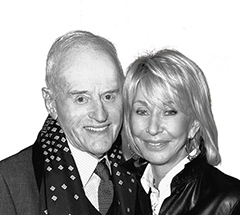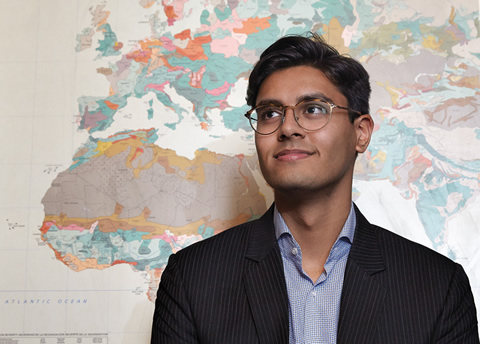A great idea can strike at any time. For second-year Munk School student Adam Sheikh, an ordinary evening watching television led him to create a non-profit organization that could save thousands of lives.
Sheikh, 19, learned from the Discovery Channel that some of the actors from the movie Alien had complained of overheating during filming because of the massive costumes they had to wear – and that a specialized vest could have helped them keep cool. “I started looking into this concept of cooling vests, and I figured maybe it could work elsewhere.”
Inspired to tackle a global problem by his professors in the Munk One first-year foundation program, Sheikh came up with the potentially life-saving idea of using cooling vests as a safety tool on construction sites in the Gulf region. Teresa Kramarz, a professor of global affairs and director of the Munk One program, says she and her colleagues encourage students to apply what they learn at the Munk School to an issue they’re passionate about. “They’re doers. They see connections, they see how global problems are connected to local realities and they’re deeply motivated to do something,” says Kramarz.
Having spent time in the Middle East, Sheikh knew that as Qatar prepares to host the FIFA World Cup in 2022, there is mounting concern over the treatment and safety of migrant workers hired to build stadiums and other infrastructure. A report on working conditions in Qatar, published in 2014, estimated that 7,000 migrant workers could die before the World Cup begins – partly as a result of having to perform heavy labour in summer temperatures that regularly exceed 40 degrees Celsius.
With cooling vests, Sheikh identified a critical way to intervene. He and a group of students – including peers from the Munk School of Global Affairs – formed Aegis, a non-profit organization dedicated to providing cooling vests to migrant workers.
To pilot the project, Aegis partnered with manufacturer Inuteq and Six Construct, a construction company that works in the Gulf region. Armed with 100 cooling vests, Sheikh and his Aegis colleagues visited Qatar last summer to test the effectiveness of their proposal on one of Six Construct’s construction sites.
“We would measure the workers’ body temperature, heart rate and blood pressure,” says Sheikh. “In one month, the number who had high blood pressure dropped by 50 per cent. By the end of our testing, the workers gave the vests an average rating of seven, with zero being ‘I felt no cooling’ and 10 being ‘I felt no heat at all.’”
Sheikh and his colleagues returned to Canada and worked with Inuteq to refine the vest’s design to meet specific safety and cooling needs. Their vests now have high-visibility striping, and the material is thicker than standard, which extends the cooling time. Aegis is the sole distributor of these improved vests, and is working with Six Construct in the hope of supplying 10,000 to the company’s World Cup construction sites.
Last October, Sheikh’s Aegis colleagues presented their work at the Vatican Youth Symposium, a two-day assembly where young leaders from around the world shared ideas for achieving the UN’s Sustainable Development Goals. “Adam has developed a toolkit for engaging with a problem in a very specific, tangible way,” says Kramarz. “This reflects the mindset we want to create in our students – of the globally engaged citizen.”

Peter and Melanie Munk
Munk One is a foundational year program housed at the U of T’s Munk School of Global Affairs. The school is a forum for exchanging breakthrough ideas and a vantage point for looking beyond national borders to help foster social resilience on a global scale. In 2010, the Munk School of Global Affairs received a transformative gift of $35 million from Peter Munk (BASc 1952) and Melanie Munk, the largest single gift from individuals in the university’s history at the time.
Recent Posts
People Worry That AI Will Replace Workers. But It Could Make Some More Productive
These scholars say artificial intelligence could help reduce income inequality
A Sentinel for Global Health
AI is promising a better – and faster – way to monitor the world for emerging medical threats
The Age of Deception
AI is generating a disinformation arms race. The window to stop it may be closing





One Response to “ Munk One Students Think Locally, Act Globally ”
This was a fascinating article, but it was marred by two problems.
First, where is the "Gulf region"? Its proper name is the Persian Gulf region. You don't call the English Channel just "the Channel"! Second, in the picture, Mr. Sheikh is positioned in front of the map in such a way that you can’t see the Persian Gulf region.
Kourosh Dinyari
Edmonton